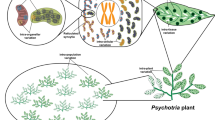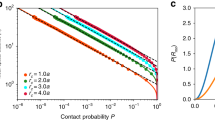Abstract
FROM the point of view of cell physiology we can distinguish two distinct levels of gene action. One level is that at which the synthesis of macromolecules is controlled. The second level is that of the organization of macromolecules into physiological units. In differentiated cells it seems probable that the synthesis of macromolecules is normally under rather direct control of Mendelian (chromosome) genes, whereas their organization into functional units is often largely controlled by cytoplasmic inheritance (for reviews, see Lwoff1, Ephrussi2, Michaelis3 and Danielli, Lorch, Ord and Wilson4).
This is a preview of subscription content, access via your institution
Access options
Subscribe to this journal
Receive 51 print issues and online access
$199.00 per year
only $3.90 per issue
Buy this article
- Purchase on Springer Link
- Instant access to full article PDF
Prices may be subject to local taxes which are calculated during checkout
Similar content being viewed by others
References
Lwoff, A., “Problems of Morphogenesis in Ciliates” (Wiley, New York, 1954).
Ephrussi, B., “Nucleo-cytoplasmic Relations in Micro-organisms” (Clarendon Press, Oxford, 1953).
Michaelis, P., “Adv. Genet.”, 6, 288 (1954).
Danielli, J. F., Lorch, I. J., Ord, M., and Wilson, E., Nature, 176, 1114 (1955).
Author information
Authors and Affiliations
Rights and permissions
About this article
Cite this article
DANIELLI, J. Cytoplasmic Inheritance. Nature 178, 214–215 (1956). https://doi.org/10.1038/178214b0
Issue Date:
DOI: https://doi.org/10.1038/178214b0
This article is cited by
-
Untersuchungen An R�ntgenmutanten DerOenothera Berteriana
Zeitschrift f�r Vererbungslehre (1962)
Comments
By submitting a comment you agree to abide by our Terms and Community Guidelines. If you find something abusive or that does not comply with our terms or guidelines please flag it as inappropriate.



